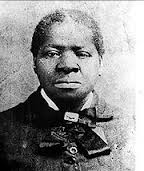Bridget “Biddy” Mason, born a slave in 1818, claimed her freedom and found opportunity on the American frontier. In 1891, she died a rich and free woman who had stared adversity in the face-and had come out swinging. When Biddy was young, she was the property of Robert and Rebecca Smith, plantation owners in Georgia or Mississippi. In 1847, the Smiths became Mormon converts and left for Salt Lake City, Utah, with slaves in tow. Four years later, the Smiths brought their slaves with them to southern California. Among them were Biddy and her three daughters, Ellen, Ann, and Harriet. (Biddy may have been married, or Smith may have fathered the children. No one knows for sure.) Biddy and her children traveled with a wagon train, but they didn’t ride. Instead, they walked mile after mile, herding their owner’s sheep. Biddy arrived in Los Angeles and learned that California had recently joined the Union as a free state. That meant slavery was prohibited, yet Biddy and her family remained enslaved for five more years. When officials at last began enforcing the California law, Smith hastily made secret plans to move Biddy, her sister, Hannah, and their eleven children to Texas, which permitted slavery. Biddy wasn’t about to let that happen, though. On the sly, she visited a free black man who owned a successful livery stable. Charles Owens was a leader among a dozen free blacks living in Los Angeles, then a small town of 1,600. The fee blacks had bought or been given their freedom and settled in California after it was admitted to the Union as a free state in 1850. Although slavery was illegal in California, blacks were far from equal. Most held low-wage jobs, including being laundresses and maids. Blacks (and Native Americans) could not testify against whites in criminal or civil court. They could, however, file lawsuits and be present in court, which was a good thing for Biddy. Biddy had some pull with Owens, whose son was in love with Biddy’s teenage daughter Ellen. To save his son’s girlfriend and her family, Charles got busy thwarting Smith’s flight. Charles Owens contacted his friend – the sheriff! “Smith’s been keeping slaves for five years, and he’s sneaking them out through the Santa Monica Mountains tonight,” Owens told the sheriff. It’s time to act. That night deputies swooped down on Smith’s wagons and rescued Biddy, Hannah and their eleven children. The case to determine what should happen to Biddy and her family went to court in 1856. In court, Biddy’s owner claimed that he was merely a transient passing through California with his slaves, which the law allowed. Biddy could easily have refuted that, but could not testify against Smith in court. Thankfully, the judge was sympathetic. He called Biddy into his chamber and left her speak on her own behalf. “I’ve been kept in slavery against my will in California, and slavery is not allowed here,” Biddy said firmly. “I want to be free.” The judge listened, nodded then returned to his bench in the courtroom. There he banged his gavel and proclaimed, “Biddy Mason, you and your family are free from the shackles of slavery, in the great state of California. Biddy then rented a house and began working as a midwife and nurse. She settled in Los Angeles, where Dr. John Strother Griffin hired her, and she was soon in high demand among his pregnant patients. Biddy also worked as a nurse for prisoners in the county jail and patients in the county hospital. During a smallpox epidemic, she risked her own life nursing the sick. With her earnings, Biddy bought two lots just outside of town on Spring Street, then two more. The lots became prime downtown real estate that was worth a fortune. Making a good living wasn’t Biddy’s main goal in life, however. Her house on Spring Street became a shelter for stranded ex-slaves and travelers in need. Long lines of poor people of all races found a helping hand at “Grandma Mason’s” home. After local flooding wiped out area homes, she opened grocery store accounts for the victims, then paid the bills. There was no end to Biddy’s generosity, for her philosophy was “If you hold your hand closed, nothing good can come in. But the open hand is blessed, for it gives in abundance, even as it receives.” Biddy died in 1891 at the age of 73. Today, at Biddy Mason Park near the site of her Spring Street home, a mural honors Biddy’s legacy as a powerful black woman who never gave up and never stopped giving.
Follow Me
© 2025 Chris Enss | Privacy Policy | Design by Winter Street Design Group | Login

